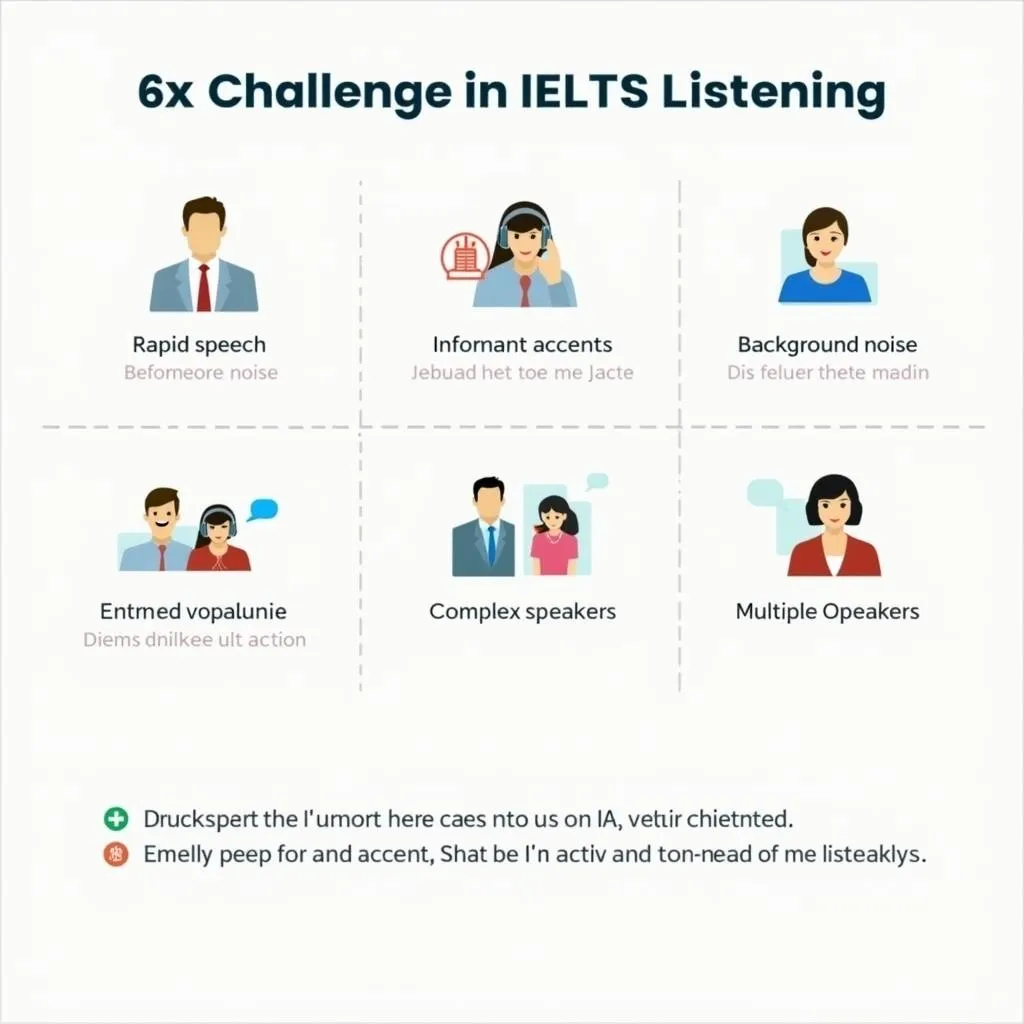Understanding IELTS Listening Challenges
The IELTS Listening test is designed to assess a candidate’s ability to understand spoken English in various contexts. However, certain sections can be particularly challenging for test-takers. These difficult sections often include fast-paced conversations, academic lectures, or dialogues with multiple speakers. Understanding the nature of these challenges is the first step towards overcoming them.
Common Difficulties in IELTS Listening
- Rapid speech
- Unfamiliar accents
- Background noise
- Complex vocabulary
- Multiple speakers
- Distractors in answer choices
Recognizing these challenges allows test-takers to develop targeted strategies for improvement.

Strategies for Tackling Difficult Sections
Improve Your Concentration
Maintaining focus throughout the listening test is crucial. Practice active listening by:
- Eliminating distractions during practice sessions
- Engaging with the audio mentally, anticipating what might come next
- Taking short, focused notes to keep your mind engaged
Familiarize Yourself with Various Accents
IELTS Listening tests feature a range of English accents. To prepare:
- Listen to podcasts, news broadcasts, and videos from different English-speaking countries
- Practice with IELTS preparation materials that include various accents
- Pay attention to pronunciation differences and intonation patterns
Expand Your Vocabulary
A broad vocabulary is essential for understanding complex discussions. To enhance your lexicon:
- Read widely on diverse topics, particularly academic texts
- Create a vocabulary journal, focusing on words commonly used in IELTS contexts
- Use newly learned words in your speaking and writing practice
Practice with Authentic Materials
Exposure to genuine IELTS-style content is vital. Utilize:
- Official IELTS practice tests
- Academic lectures and TED Talks
- News reports and documentaries
These resources help simulate test conditions and familiarize you with the types of content you’ll encounter.
Develop Note-Taking Skills
Effective note-taking can significantly improve your performance. Try these techniques:
- Use abbreviations and symbols to write quickly
- Focus on key information: names, numbers, dates, and main ideas
- Practice organizing your notes in a logical structure
Predict and Anticipate
Train yourself to predict what you might hear:
- Read the questions before the audio begins
- Use context clues to anticipate potential answers
- Pay attention to signpost language that indicates important information
Specific Strategies for Different Question Types
Multiple Choice Questions
- Read all options carefully before the audio begins
- Listen for synonyms or paraphrases of the options in the audio
- Eliminate incorrect answers as you listen
Matching Questions
- Quickly scan all items and options before listening
- Listen for key words that connect items to their matches
- Cross off options as you use them to avoid confusion
Completion Tasks
- Read the surrounding context to understand what information is needed
- Pay attention to the word limit specified in the instructions
- Listen for exact words or synonyms that fit the gaps
Map/Diagram Labeling
- Familiarize yourself with the layout before listening
- Listen for directional language and spatial relationships
- Double-check your answers align with the visual information provided
Improving Your Overall Listening Skills
Regular Exposure to English
Immerse yourself in English language content daily:
- Watch English movies and TV shows with subtitles
- Listen to English music and try to understand the lyrics
- Engage in conversations with native speakers when possible
Focus on Weak Areas
Identify your specific weaknesses in listening and target them:
- If you struggle with numbers, practice with numerical data in various contexts
- For accent difficulties, increase exposure to that particular accent
- If speed is an issue, gradually increase the playback speed of audio materials
Utilize Technology
Take advantage of technological tools:
- Use language learning apps with listening exercises
- Access online IELTS preparation platforms with interactive listening tasks
- Record yourself summarizing what you’ve heard to improve comprehension and speaking skills
Final Tips for Test Day
- Get a good night’s sleep to ensure maximum alertness
- Arrive early to familiarize yourself with the test environment
- Stay calm and focused throughout the test
- If you miss an answer, move on quickly to avoid losing more information
- Use the time given at the end to review and transfer your answers carefully
Remember, improving your performance in difficult IELTS Listening sections is a gradual process. Consistent practice and application of these strategies will lead to significant improvements over time.
By implementing these strategies and maintaining a consistent study routine, you’ll be well-equipped to handle even the most challenging sections of the IELTS Listening test. Stay motivated, track your progress, and don’t hesitate to seek additional resources or professional guidance if needed. With dedication and the right approach, success in IELTS Listening is within your reach.